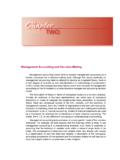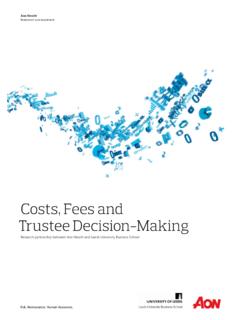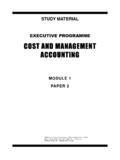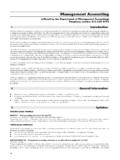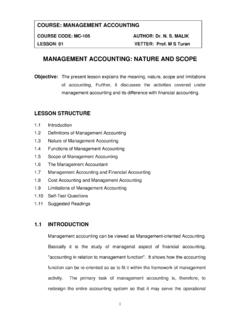Transcription of THE ROLE OF MANAGEMENT ACCOUNTING IN …
1 Annales Universitatis Apulensis Series Oeconomica, 15(2), 2013, 355-366 355 THE ROLE OF MANAGEMENT ACCOUNTING IN THE decision MAKING PROCESS: CASE STUDY CARA SEVERIN COUNTY Adela Breuer1 Mihaela Lesconi Frumu anu2 Andra Manciu3 ABSTRACT: MANAGEMENT ACCOUNTING is an important part of the economic information system, with a key role in decision making, whether we talk about small and medium enterprises or large companies. However, MANAGEMENT ACCOUNTING is superficially treated in most economic entities, there are entities in which professional accountants consider MANAGEMENT ACCOUNTING as optional, as shown in the survey performed in Cara Severin County, querying 50 economic entities from the three categories (microenterprises, SMEs and large companies) and processing the results in SPSS.
2 Keywords: MANAGEMENT ACCOUNTING , economic information system, decision making, MANAGEMENT , cost JEL Codes: M41 Introduction Information and the information system are terms with increasing impacts on the enterprises, invading the models and the MANAGEMENT analysis fields. Exactly as in any other information system, the economic information system contains news and information from different fields, but most of them derive from the economic database. The most representative sources of economic data and information are (Ovidia, 2013): - The economic planning, which provides economic informational planning and business prognosis data, their share being of 28% of the total economic information; - The economic database which provides effective information data, representing 70% of the total economic information, distributed as follows: 46-50% information provided by ACCOUNTING .
3 9-13% information provided by the economic-social statistics; 11% of the information is provided by the active database; Other sources represent the rest of the 2% percentage. Hence, the information of the economic information system are mostly (70%) provided b y the economic evidence/database, mentioning that most part of information in organizations include ACCOUNTING information (Zare and Shahsavari, 2012: 5-10), a statement sustained by the fact that the ACCOUNTING information systems includes components and elements of an organization that provides informations for users by processing financial events (Zare , 2012: 32-38).
4 Based on the ACCOUNTING information function, which is to provide information in order to substantiate decisions, and considering the two components of ACCOUNTING (financial and managerial ACCOUNTING ), we can assert that ACCOUNTING has an internal information function (for the enterprise MANAGEMENT ) and an external one (for the third parties). Internal decision -making and analysis of cause-and-effect relationships can require very specific models and ACCOUNTING information (Eierle and 1 Eftimie Murgu University of Resita, Romania, e-mail: 2 Eftimie Murgu University of Resita, Romania, e-mail: 3 West University Timi oara, Romania, e-mail: Annales Universitatis Apulensis Series Oeconomica, 15(2), 2013, 355-366 356 Wolfgang, 2013).
5 Because managers should obtain high-quality and suitable information from formal and informal channels for decision -making (Zare , 2013: 589), and because financial ACCOUNTING information is regarded as not being adequate (Eierle and Wolfgang, 2013), the managerial ACCOUNTING -provided information underlie the decision making both inside and outside the enterprise According to Law 82/1991, ACCOUNTING in Romania is organized in double circuit, financial ACCOUNTING and MANAGEMENT ACCOUNTING .
6 The formal dualism or the ACCOUNTING system in two circuits is an organization of the ACCOUNTING system that allows a dissociation between the financial ACCOUNTING , which is subject for standardization, and the managerial ACCOUNTING , for which the following rule is applied no admittance except on business (Diaconu, 2002: 23) and which ensures the advantage of high ACCOUNTING information confidentiality (Cre u and Iova, 2011). Studies made in the field of Managerial ACCOUNTING Literature review ACCOUNTING is an information system and managers should obtain high-quality and suitable information from formal and informal channels for decision -making (Zare et al.)
7 ,2013) At the beginning of 90 managerial ACCOUNTING was reconsidered, we witnessed a separation of the two components of the ACCOUNTING system (financial and managerial ACCOUNTING ) (Cardo and Pete, 2011). Assuming that each entity has the right to create its own information system (own communication channels, responsible persons, etc), then we can characterize the information system of the MANAGEMENT ACCOUNTING as being the sum of procedures, means and regulations that are used for the collection, processing, transmission, use and storage of the ACCOUNTING information without being disclosed to the public without disclosure (Briciu and Teiu an, 2006).
8 In order to prove that the MANAGEMENT ACCOUNTING belongs to the ACCOUNTING information system, we will analyse the participation of this ACCOUNTING to the functioning of the ACCOUNTING system. Thus, MANAGEMENT ACCOUNTING provides a detailed overview of each activity, whence the denomination of analytic ACCOUNTING (Budugan et al., 2007: 10), following the collection and distribution of expenses on activities, as well as the calculation of costs from the production, trade, service providing and financial units and from other fields of activity (OMFP ), thus providing data necessary for the users of the ACCOUNTING information.
9 In a general sense, managerial ACCOUNTING is an integral part of MANAGEMENT that deals with identifying, presenting and interpreting information used for strategies, decision making, resource optimization, employee information, asset protection planning and control of activities, information of associates or other external information users. ( Briciu, and C pu neanu, 2011: 57-68) Professor Oprea C lin considers that MANAGEMENT ACCOUNTING has as main objective the reflection upon all the operations of cost collection and allocation by destinations, products, works, services, orders, manufacture phases, activities, departments, etc, the settlement of the obtained production, as well as the calculation of the production cost for the manufactured products, the executed works and the provided services, including the production-in-progress (C lin.)
10 2002: 15). Professor Henry Bouquin proposes the following definition of MANAGEMENT ACCOUNTING : a system of ACCOUNTING information that intends to help managers and influences behaviours by shaping the relations between the consumed allotted resources and the aimed finality ( Bouquin, 2004: 11-12). Managers direct the future and constantly report it to the present (Bouquin, 2004: 45), and MANAGEMENT ACCOUNTING provides information about the future and about what is going to happen (Diaconu, 2006).



